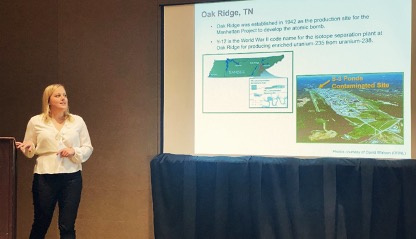
Since June 2021, University of Georgia undergraduate student Elizabeth Szink has been working in the lab of ENIGMA principal investigator Mike Adams under the guidance of ENIGMA postdoctoral researcher Jennifer Goff. She received a $1,000 research award from the CURO (Center for Undergraduate Research), as part of an initiative to enhance the UGA learning environment. The CURO Research Award provides 500 scholarships of $1,000 each to outstanding undergraduate students across campus to actively participate in faculty-mentored research.
Elizabeth is currently a 5th year Biochemistry student and graduates this May (2022). Recently, she shared her experience as an ENIGMA undergraduate researcher.
Can you describe your undergraduate research project to us?
My research characterizes an environmental microorganism originating from a radionuclide contaminated subsurface environment. Despite the nature of the contaminants found at the waste site (nitrates, acidic pH and heavy metals), metal-resistant microbes capable of nitrate respiration have been identified and isolated. I evaluated the effects of site-relevant toxic metals and different pHs on the growth and nitrate or nitrite utilization by one isolate from the site. Furthermore, I assisted in genomic analysis which identified potential genetic determinants that may play a role in metal resistance for this microorganism.

ENIGMA is a multi-institutional and highly collaborative project. What resources were available to you through this organization that you may not have had access to otherwise?
The multi-institutional nature of the project has given me exposure to a variety of bioinformatic tools such as KBase, which can be utilized to better inform experimental design and enable researchers to predict experimental outcomes in biological systems. Additionally, participating in the joint collaboration has given me an increased appreciation for the teamwork and leadership skills necessary for collaboration at such a scale.
How has your work on this project impacted your scientific communication skills? In what ways have you been able to disseminate your results?
Working on this project for three consecutive semesters has challenged me to improve skills in data representation, as well as improving my presentation of results both orally and written. I shared my scientific findings orally with my peers at UGA’s symposium for undergraduate researchers, as well as at a three-minute thesis showcase held for underclassmen interested in getting involved in research on campus. Additionally, I assisted in the writing of a manuscript which was recently accepted for publication.
What are your plans for after graduation?
After graduation in May, I will spend two months working at UGA’s Skidaway Institute of Oceanography, working on a project exploring the diversity of marine microorganisms. Fortunately, my ENIGMA research experience will not end there as I was offered the opportunity to continue working part-time in the Adams lab while I take a gap year prior to applying to medical schools.
How has your scientific identity changed through your participation in this research experience?
My participation in undergraduate research allowed me to hone my problem-solving skills and develop a deeper understanding of the scientific process. Three semesters of hands-on experience allowed me to transition from assisting other researchers to carrying out experiments independently. In addition to the academic credentials research participation afforded me, I had the opportunity to make a meaningful contribution to the body of scientific knowledge by assisting in the writing of a journal article.
Contact
Mike Adams <adamsm@uga.edu>
University of Georgia – Athens
